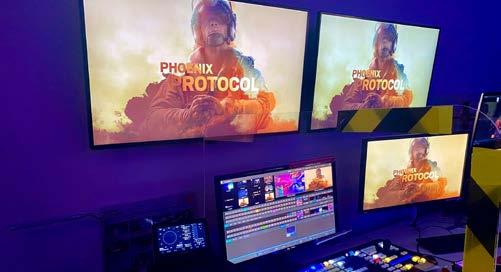
9 minute read
Esports on the rise
ESPORTS RISEON THE
The first cohort of students from the UK’s first esports degree will graduate this summer – from Staffordshire University. Course Director Nia Wearn tells Horizon magazine how the University is leading the way.
When the UK’s esports industry challenged higher education to produce graduates with the skills required to work in the fast growing sector, it was Staffordshire University that stepped up to the plate.
It launched the country’s first esports degree course, which is also believed to be amongst the first around the globe.
Now, that first intake of 72 esports undergraduate students is set to be released into the world of work, with many already securing jobs in an industry thirsty for fresh talent.
“We have students who have already lined up jobs working behind the scenes running esports events, working in moderation, marketing and broadcasting,” says Nia, Course Director for Esports, Game Studies and Communities.
“They’re acting as runners, they’re working with content creation, tournament design. Every element that the industry needs people involved in, we have elements on our course where you can see the students picking up the specialities.
“When events pivoted to being online last year we also then followed suit in making sure that our students are ready, capable and experienced in running a variety of online esports events and taking the helm in all of the different elements of that.”
Of course the esports course wasn’t simply created from scratch, but rather builds on Staffordshire University’s long-standing reputation for games courses.
Nia says: “Although it’s a new course, it’s not new for Staffordshire University to be engaging with the latest technology or trends within interactive entertainment or with games as a whole.
“We obviously are building on an incredibly strong set of games courses. We have a really strong and well-developed department which esports now sits in.
“It is a very natural progression for us to be looking at this course and how we start to help to fill a skills gap that has already been recognised within the UK and global esports and games industry.
“So we took pointers from UKIE, The Association for UK Interactive Entertainment, who set out a challenge to higher education institutes a number of years ago now, to start to incorporate esports into their courses.”
As far as Staffordshire
University is concerned it was challenge accepted. “We started with a module, testing the water to see the student engagement. When that came in and we saw that students really wanted to build this kind of knowledge base and have practice in running esports events then we took that forward to the full “ALTHOUGH IT’S A NEW degree that we have now. “We became the first COURSE, IT’S NOT NEW FOR STAFFORDSHIRE university in the UK with a full undergraduate and postgraduate esports teaching
UNIVERSITY TO BE programme. “From what we can see ENGAGING WITH THE we were more or less leading LATEST TECHNOLOGY the way globally in having a dedicated esports title for a BA.
OR TRENDS WITHIN It’s an incredibly rare thing
INTERACTIVE that we have these very specific job titles that our students will
ENTERTAINMENT” be having. It’s the job title that will help them unlock careers in areas within the games industry.” Working so closely with the esports trade body from the very beginning meant that the course could be carefully tailored to maximise the employability of graduates. “We’ve certainly kept a very close eye on how jobs have changed and what elements are required in the jobs that are being advertised,” says Nia. “We keep a close eye on job descriptions and roles and how they adapt, which softwares they need, which field specialisms employers are asking for and making sure those elements are in the modules that we deliver to our students.”

As well as working closely with gaming trade bodies,the department’s own staff have experience of working in the esports industry on various campaigns and events.
By its nature the esports course is very practical and hands on but it does include more academic teaching including the likes of esports culture, sport integrity and community management.
“We understand that these are students who can adapt and research and understand large changes and large groups of consumers and players as well as being able to practically run events,” says Nia.
Such is its dominance in the field that Nia says most graduate recruits into esports over the next few years are likely to have a Staffordshire University degree on their CV.
“The UK esports industry is huge so there’s certainly a good groundswell of companies taking note of the fact that we have graduates with esports in the degree title.
“A lot of our postgraduates have worked in games companies because they’ve understood delivering products to large groups of players.
“Already there is an amazing establishment of Staffordshire University games alumni, so pulling that into esports we can foresee that there will be a lot of Staffordshire University graduates in and amongst the industry as it matures.”
Like the leaders of any successful course, Nia and her team are determined not to rest on their laurels but rather to ensure the learning they deliver continues to adapt to the requirements of the industry.
“We’re starting to look now at how we can adapt. We’re looking now at maybe how we can finesse the course a little bit so that there’s more specific routes coming through and I think that’ll form a really exciting offering to prospective students.
“They’ll see that this isn’t just a one off thing, that this is something that we’re building on.
“We’re starting to see students coming through who want to specialise in certain areas. It’s a course that will continually be in flux and in development as the industry itself is.
“It needs to be to keep up with technology but also to keep up with players and trends.
“We have younger people coming in, we have children now who are very adaptive and used to esports. We have children who are used to watching and consuming YouTube as entertainment as opposed to just a knowledge resource.”
Nia adds: “There are going to be a lot of changes coming through in the demographic of students that we have and also the demographic that we work with.
“There’s a real difference in understanding the far reaching aspects of esports and understanding the positives that can come out of it. It’s really exciting to see the course backing up and supporting those positive initiatives.”
DID YOU KNOW?

• Esports can be studied at Stoke-on-Trent or at
Staffordshire University’s London campus. • The three year course can be combined with a placement or foundation year. • Students have access to a specialist esports lab and a pro gamer training facility. • Esports students can join competitive societies including games such as League of Legends, DOTA2, Hearthstone, Counter
Strike, Overwatch and Super Smash Bros and compete in events in the UK and overseas. • 72 students were accepted onto the first year of the esports course, which increased to 107 in the second year.

SO WHAT’S IT ALL ABOUT?
• Esports is short for electronic sports and involves computer game players competing against one another. • Coronavirus restrictions allowing, esports tournaments take place in front of huge crowds in large capacity arenas around the world. Some players are famous in the esports world and compete in teams alongside teammates.
• Top esports players dedicate many hours to training, which is perhaps not too surprising considering the prize money at stake at some tournaments can run to many thousands of pounds. • Esports is a multi-billion-pound global industry, with some tournaments attracting millions of online viewers around the world.
• The IOC has considered introducing esports to the Olympic Games. While it has not taken that step yet it hasn’t been ruled out for the future.
JUST ONE SUCCESS STORY

Dani Morgan may have known ‘little to nothing’ about the world of esports when she started her degree course, but as a new graduate she has already secured a job in one of the fastest growing industries in the UK.

Last October the 21-year-old, from Shropshire, found herself a part-time job with AFK Creators, a UK-founded agency for streamers and talent in the gaming industry. In June she started working for the company full-time.
“To begin with I didn’t really know what I wanted to study at university,” she says. “I didn’t even know if university was going to be right for me.
“I’d always been very academic and had always had a bit of an interest in gaming, more as a hobby than anything else. I was running out of time to decide what I wanted to do.
“I debated studying psychology and becoming a psychiatrist, but in the end I decided to do what I enjoy. Joining the UK’s first esports degree in its first year was a massive leap of faith for me.
“I came in on that first day not even knowing who the big esports teams were. All my classmates were talking about things I didn’t know about.”
Dani has chosen to focus on the marketing and creative side of esports, which she says satisfies both the academic and creative sides of her personality.
“At AFK Creators I’ve been working closely with two colleagues on the marketing team. Over time I’ve put in more and more hours and taken more of a role in the running of marketing and social media within the business. I’ve been negotiating what that would look like for me going forward and sorting out my place within the company.”
During the course, Dani and a fellow student staged a show match to raise funds for The Prince’s Trust from the esports hub on campus. They had around 11.5 hours of content which was watched by around 100,000 people and raised around £3,000 for the charity.
For Dani, the course’s real strengths include close links with the esports industry that allow students to network and make contacts.
She adds: “The lecturers have been fantastic and they’re always so supportive. They’re always there to support and give advice.
“A big issue with esports is unpaid work, that there are a lot of people out there who might exploit other people. The lecturers are so helpful in that area and are able to give a true insight as they have experience in the field themselves.”

Behind the scenes at an esports event Dani Morgan organised during her final year.










